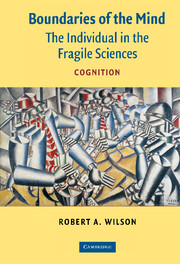Book contents
- Frontmatter
- Contents
- List of Tables and Figures
- Acknowledgments
- Boundaries of the Mind
- PART ONE DISCIPLINING THE INDIVIDUAL AND THE MIND
- 1 The Individual in the Fragile Sciences
- 2 Individuals, Psychology, and the Mind
- 3 Nativism on My Mind
- PART TWO INDIVIDUALISM AND EXTERNALISM IN THE PHILOSOPHY OF MIND AND THE COGNITIVE SCIENCES
- PART THREE THINKING THROUGH AND BEYOND THE BODY
- PART FOUR THE COGNITIVE METAPHOR IN THE BIOLOGICAL AND SOCIAL SCIENCES
- Notes
- References
- Index
1 - The Individual in the Fragile Sciences
Published online by Cambridge University Press: 02 December 2009
- Frontmatter
- Contents
- List of Tables and Figures
- Acknowledgments
- Boundaries of the Mind
- PART ONE DISCIPLINING THE INDIVIDUAL AND THE MIND
- 1 The Individual in the Fragile Sciences
- 2 Individuals, Psychology, and the Mind
- 3 Nativism on My Mind
- PART TWO INDIVIDUALISM AND EXTERNALISM IN THE PHILOSOPHY OF MIND AND THE COGNITIVE SCIENCES
- PART THREE THINKING THROUGH AND BEYOND THE BODY
- PART FOUR THE COGNITIVE METAPHOR IN THE BIOLOGICAL AND SOCIAL SCIENCES
- Notes
- References
- Index
Summary
INDIVIDUALS AND THE MIND
Where does the mind begin and end? We think of the mind as tied to and delimited by individuals. Minds do not float free in the air or belong to larger, amorphous entities, such as groups, societies, or cultures. No, they are tightly coupled with individuals. Minds exist inside individuals, and the particular mind that any individual has constitutes an important part of what it is to be that individual. We may not know precisely when during ontogenetic development the mind begins to exist and when it ceases to exist. Indeed, we might think that there is no such precise time, and that to think otherwise is to fall into some sort of conceptual muddle. But that a particular mind's temporal boundaries are delimited by the life of the individual is reflected in both Western science and law.
Likewise, we might quibble about how far throughout the brain and central nervous system the mind extends spatially. But again, the boundary of the mind is no greater than the boundary of the individual. If it doesn't stop further in, in the brain, it at least stops at the skin.
There are ways in which these ideas about the mind may appear to be challenged by pervasive systems of thought beyond science. For example, on many religious views, at least something very like the mind is neither temporally nor spatially bounded by the body by which we usually identify an individual.
- Type
- Chapter
- Information
- Boundaries of the MindThe Individual in the Fragile Sciences - Cognition, pp. 3 - 26Publisher: Cambridge University PressPrint publication year: 2004



